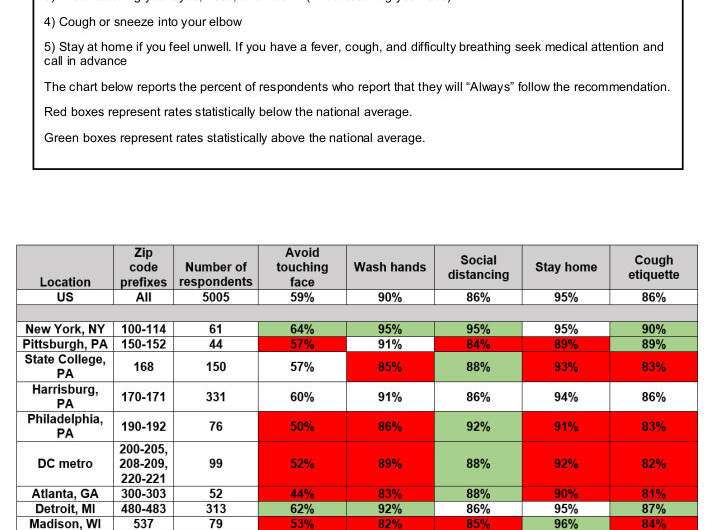Residents of some cities unwilling to comply with COVID-19 prevention behaviors

Several U.S. cities may be at increased risk of surges in COVID-19 cases as they reopen their economies because their residents are unwilling to follow practices that reduce the spread of the disease, according to Penn State researchers.
Dr. Robert Lennon, an associate professor of family and community medicine at Penn State College of Medicine, and his colleagues, including Dr. Lauren Van Scoy, co-director of the Qualitative Mixed Methods Core at the College of Medicine, developed a survey in collaboration with the College of Healthcare Information Management Executives (CHIME) to determine whether people were willing to follow key recommendations from the Centers for Disease Control and Prevention (CDC) in preventing the spread of COVID-19. Lennon says the preliminary findings, which are in press and will be published by SLACK Incorporated in an upcoming issue of HLRP: Health, Literacy, Research and Practice, should cause concern for public health experts and government officials in certain regions.
"Our data indicate that there is a public lack of intent to comply with certain CDC recommendations in several parts of the United States," said Lennon, principal investigator of the study. "As a result, these areas might be at increased risk for a surge in COVID-19 cases as quarantine restrictions ease."
Study participants reported demographic information as well as their knowledge of and intent to comply with the CDC's five recommendations for preventing COVID-19. The recommendations are:
- Wash your hands often (for 20 seconds or more);
- Maintain social distancing/social isolation even if you have no symptoms;
- Avoid touching your eyes, nose, and mouth (avoid touching your face);
- Cough or sneeze into your elbow; and
- Stay at home if you feel unwell. If you have a fever, cough and difficulty breathing seek medical attention and call in advance.
The global survey, available online in more than 23 languages, assesses public perceptions and compliance with COVID-19 health safety recommendations. Lennon and fellow investigators at Penn State College of Medicine developed the questionnaire and CHIME provided the infrastructure for the survey and has helped distribute it globally.
"It is important that we have accurate data from around the world to address the pandemic," said CHIME President and CEO Russell Branzell. "We have the ability to examine data at the city level or expand to the country level and beyond to assess what precautions are being followed. This will help health organizations proactively revise their public education programs, which is key to keeping their communities healthy and safe."
Lennon and colleagues analyzed responses from more than 5,000 U.S. adults who completed the survey between April 9 and 15. They used three-digit zip code prefix areas to determine where the participants lived.
Respondents showed substantial, significant differences in their intent to comply with CDC recommendations across different cities. Lennon says that as compliance falls below 80%, the behaviors are less likely to be effective. The team documented a particularly low intent to comply with the recommendation they said is the most important—avoid touching your face. Half or fewer of respondents from Atlanta, Minneapolis, Philadelphia and Seattle said they intend to comply with that one measure. (See table below.)
While respondents indicated fairly high intent to comply with other recommendations, all of the cities investigated had compliance near 80% for at least some of the other behaviors. Lennon cautions that the actions of even one individual might undo the work of the majority of people who are following recommendations carefully. For example, an individual leaving home when they are experiencing COVID-19 symptoms may put others at risk for exposure.
The anonymous survey, which has been completed in every state in the U.S. and 70 countries, will remain open until July 9. It takes about five minutes to complete and is available at https://COVIDsurvey.psu.edu/c/beatcovid. Lennon says that the data may be used to help get people appropriate information from sources they trust to prevent the spread of COVID-19.
"We encourage everyone to participate, especially communities that have been disproportionately impacted by COVID-19," Lennon said. "It's an opportunity to lend your voice in the fight against this devastating disease."


















